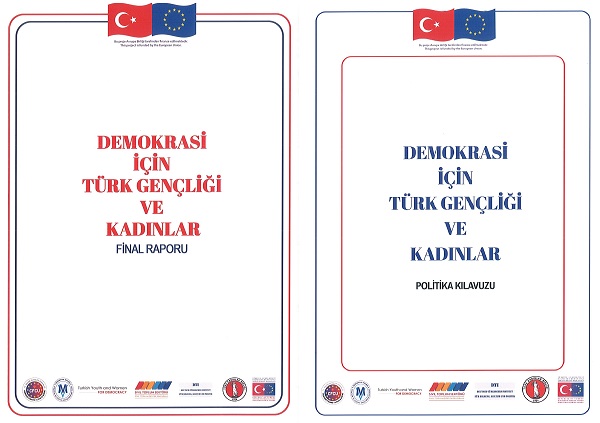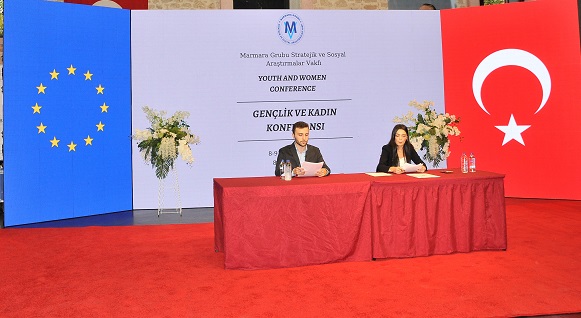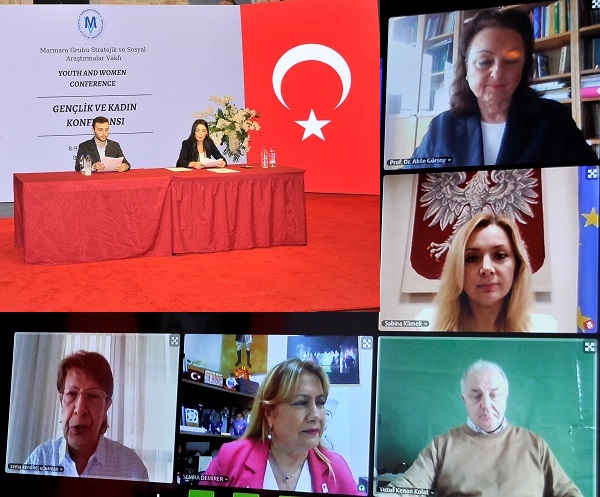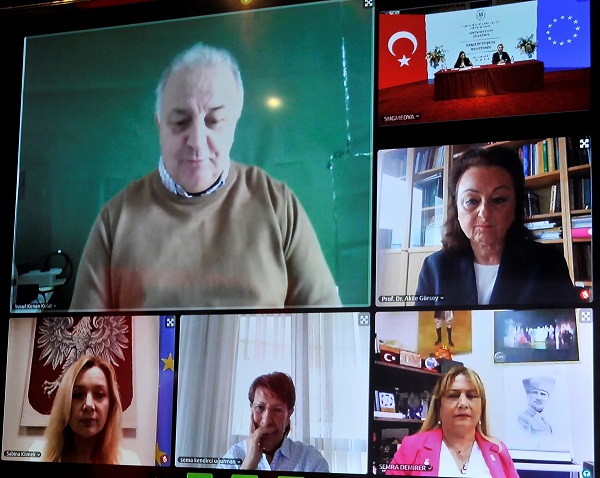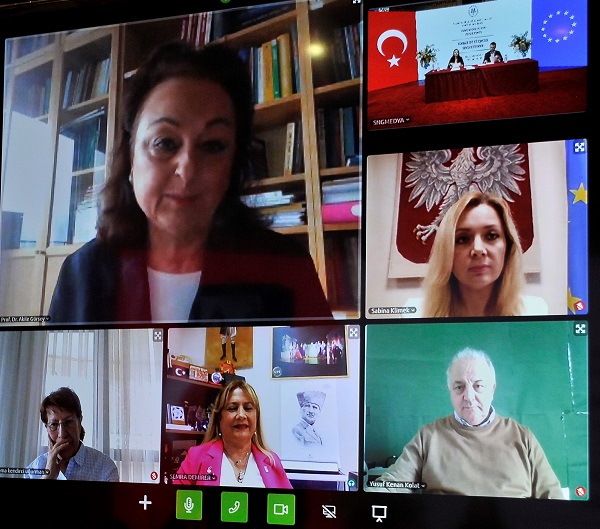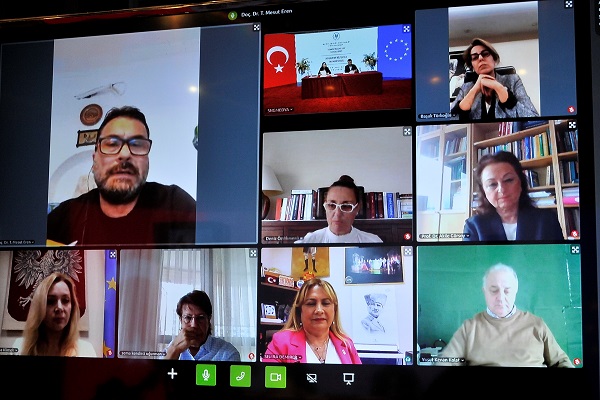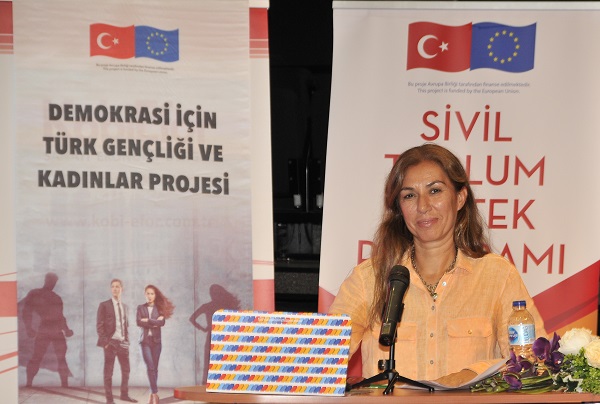Marmara Group Foundation EU and Human Rights Platform published 2 New Books
Marmara Group Foundation EU and Human Rights Platform have published two separate books about the EU Project "Turkish Youth and Women for Democracy", which they have successfully completed. You can also read the books titled "Turkish Youth and Women for Democracy Final Report" and "Turkish Youth and Women Policy Guide for Democracy" on the website "democrasiyolunda.com".
We present the preview of our Final Report book below.
It is a known fact that many needs in human history have been met by the organizations of societies. In modern societies, in addition to representative governance structures, it is observed that organizations aiming to undertake social responsibilities voluntarily, and all non-governmental organizations (NGOs), whether in legal structures such as associations, foundations, professional chambers, or initiatives such as platforms, are gaining strength. In our country, the increasing effects and weight of NGOs in our daily life and management structure are felt more and more every day. A better communication among themselves as the strengthening of NGOs and the development of closer cooperation has also indispensable for the establishment of a participatory democracy in Turkey.
Despite increasing role of NGOs in Turkey, due to lack of communication among themselves healthy synergy and efficient teamwork have not yet reached the expected level. Due to the lack of a national NGO Center (except for roof formations such as STGM, Civil Think) that Facilitating communication between NGOs and serves the development of NGOs many NGOs are not even aware of their existence is not only failing to learn about the activities of other related NGOs in Turkey.
The prerequisite for NGOs to fulfill their functions adequately, to carry out their work successfully and to increase the influence of the civil society field depends on their democratic relationship with each other. Various developments in the world and Turkey, have led to major changes encountered in the field and NGOs are affected by this change in NGOs.
Due to the dynamic nature of the CSO field on a world scale, besides the fact that there are frequent changes in communication, information and members, a series of special political / economic crisis in Turkey has led to significant changes in their structuring by reducing the opportunities of NGOs to find sponsors from local and national sources. Apart from the funds of international institutions such as the European Union, non-governmental organizations seem to have no financial resources left. Therefore, the need for trainings that will enable CSOs to access these funds that will improve their financial capacities is increasing. As a result of the developments in technology, the decrease in the prices of digital equipment and services, the Internet has begun to be widely used among leading NGOs, but most of the local NGOs do not have the same level of facilities and knowledge.
Many private networks have recently been formed among NGOs in various sub-sectors such as women, environment and human rights.
Based on this need, we present to their attention the information and data they will need in project implementations that encourage the participation of young people and women in democratic processes, as a comprehensive and up-to-date resource.
We hope that our knowledge sharing initiative creates a basis for collaboration and networking, teamwork.It contributes to the capacity development of CSOs as a result of the transfer of knowledge, opinion and experience through the increasing communication dynamics between all relevant actors of society.
Today, we are experiencing very serious transformations in social life and our intellectual world. While the policies carried out by international companies from the nation-states of modern times cause us to experience the pain of the transition to the global world, the winds of postmodernism in philosophy, politics and art take everything in front of it. Classical liberal democracies' style of representational politics can no longer respond to the needs and complex political life of the "new society".
Discussions in the social sphere are around the idea of "democratization of democracy" and transforms participatory democracy into a participatory state open to interaction through civil networks and initiatives.
Efforts are underway to move from the "part-time" citizen of the representative democracy, who feels a citizen only every four or five years, to the "full-time" active citizen, who always seeks and opens the way to protect their problems through civil networks and organizations.
Civil society activities carried out in the same direction in our country, the negative effects of the transition from the parliamentary system to the Presidential system first, then the unexpected July 15 coup attempt and the Covid-19 epidemic immediately thereafter, detached the desired citizen from the public sphere and sentenced him to freedom within his own four walls.
While we put this work in the hands of the Civil Society Organizations, which are the pioneers and devotees of the transition to full-time citizenship, we also dedicate them to them.
We thank to Turkey and the European Union, the T.R. Ministry of Foreign Affairs EU Presidency for their financial support in preparing this book.
Müjgan Suver
.jpg)
Turkish Youth and Women for Democracy
The sixth session was moderated by Ebrar Eda Demir and Oğulcan Ulu.
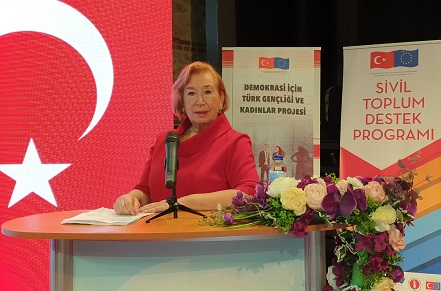
In the opening speech, President Marmara Group Foundation EU and Human Rights Platform Müjgan Suver stated that; Adapted from the last part of Beethoven's 9th Symphony, the European Anthem aims to celebrate the success of the EU countries' common values: freedom, peace, and unity in differences. These values, dreamed by the people of the world, can only be kept alive within the democracy. Therefore, the primary objective of civil society organizations in Turkey has been “strengthening the democracy." Democracy in Turkey will be strengthened with the participation of youth and women in the democratic decision-making process. "
In her speech, Sema Kendirci Uğurman, President of the Turkish Women's Union, in sum: "I would like to convey to everyone that I am very pleased to be a part of this project, to carry out with Marmara Foundation and to be a partner in an important project that aims to bring women into democracy since the day we were founded. Thank you very much for this participation. Turkish Women's Union since its creation in 1924 is Turkey's first and largest women's organization which struggles for equal rights. It is one of the organizations which beliefs democracy could develop only with women in the history of the Turkish Republic.
We continue our struggle with more than 80 branches in the country with the negotiations we made with the government. I want to say that this project is very valuable to us. Because we are an organization believing that democracy without women is crippled and incomplete since the day we were founded. Therefore, for us, democracy and women's rights are intertwined and we invite everyone to this understanding to see and accept it. Because we know that as democracy develops, women's rights will develop, and as women's rights develop, democracy will be based on the basic principles of democracy and become institutionalized. Therefore, we thank the project and our founding partners and today's participants for being side by side with us with this understanding, and we would like to thank all participants for always being shoulder to shoulder in the struggle on this road. "said.
Head of Turkish-German Education, Culture and Policy Institute Yusuf Kenan Kolat said: "In Germany, as the Germany Turkish Society, I was the president of an organization that brought gender quota in its statute for the first time among Turkish and German associations. When his votes were low, a male friend won the vote thanks to the quota. So the quota has to be for all genders, not just for women. For this reason, we attach great importance to the quota issue. Social structures should not only be made by promising but I think that they should be realized with legal regulations. This is an issue that can only happen with legal regulation. Today, in Germany, we demand quotas of 10% -20% with the quota system in German government offices for people of immigrant origin, non-German people. This is a prompt. So we always argued that; if you want to identify with the society, institutions, or organizations we live in, you must definitely be a part of it. "
.jpg)
In her speech, Ambassador Başak Türkoğlu, Director General for Relations with the EU, in sum: " Our non-governmental organizations have played an important role in our EU accession process as actors who take the pulse of public opinion in every field and will continue to play from now on. Because one of the most important elements of democracy is the existence of civil society. As the Directorate for EU Affairs, we have been especially supporting projects aimed at strengthening the dialogue between our country and the EU's non-governmental institutions and developing civil society capacity. The process of harmonization with the EU brings with it multidimensional social change and transformation beyond technical regulations. I think that the reforms carried out in the EU process in our country, where women gained the right to vote and to be elected before many countries, have significantly reinforced and strengthened the existence of Turkish women in economic, political, and social life and their status in the society. "
Beykent University Faculty of Arts and Sciences Dean Prof. Dr. Akile Reşide Gürsoy summarized in her speech that: I congratulate Mrs. Müjgan Suver, President of the European Union and Human Rights Platform of the Marmara Group Foundation, together with her whole team and everyone who participated in this project. It has been a truly comprehensive, multi-faceted project that also brings two countries together and brings age groups together. Here I want to speak as an academic. I am a social anthropologist, so I think of all subjects as manifestations in societies around the world — as my academic tradition. But this identity beyond the academics I want to speak as a member of a family that has spent its life for the democracy in Turkey. From a young age, I grew up realizing what a blessing democracy is, and how human rights violations can arise in its absence. Today, democracy, despite all its difficulties and deficiencies, in the form of administration that best suits human dignity ... It is a very difficult form of government, not so easy, but the most dignified form of administration.
Of course, there are many applications where this concept is hollowed out. Nowadays, we have witnessed that the country has been intervened because we are bringing democracy to a country. Or in the country itself, I say this in general, we see that some coups have been carried out with the claim of bringing democracy. " said.
Academician Assoc. Dr. Mesut Eren from Marmara University European Research Institute stated in his speech that: “- Especially when we meet with young people, we see that young people think that they cannot make their voices heard and they are not perceived correctly. Directed by the very old, this poses a problem in a society like Turkey, where the governed is very young. The average politician age is probably between 65-70... And the young population is much higher in Turkey. It is very difficult for this average age to get to know the new generation closely. As you remember, one of the things that affected young people the most in election campaigns was to give 10 GB of internet to each young person. The closest point to young people was the internet quota. I think this is a serious problem. Of course, in order to understand them, to understand what they think and to get their participation, very serious studies are needed. But the environment is unfortunately not suitable for this. There is not much we can say for women. We were together with the Women's Association in Germany. The problems they tell, their discourses are so different that we are in such a different dimension that this is an incomparable process with Europe. Turkey's cultural structure, which determines the status of women in religion and culture, the position of women, women's point of view, not very convenient. These are problems to tackle. I summarized the situation and painted a pessimistic picture, but without seeing these, there is no way we can solve the problems.”
.jpg)
In her speech, Danela Arsovska, President of the North Macedonian Chamber of Commerce stated that “The commitments of the Macedonian Chambers of Commerce are continuously aimed at encouraging and supporting entrepreneurship, based on knowledge and innovation in order to achieve greater economic growth. Women's entrepreneurship is a segment to which we are particularly committed, because we believe it holds the greatest potential for economic growth.
Every year we engage in an active campaign to achieve gender parity in wages and to break the glass ceiling by closing the gender gap. This year we also joined the campaign of the United Nations, OECD and the International Labour Organization to mark the International Equal Pay Day - September 18.
By supporting women's entrepreneurship, we strive for the economic empowerment of women by enabling them to have greater financial independence. “

In her presentation, Sabina Klimek, Consul of the Republic of Poland in Istanbul, stated that “I know that the number of women in business in Poland and in Turkey is very much similar. We have got now around 31% of female entrepreneurship in Poland. But I know that in Turkey it is 28%. So from all business people in Turkey, 28% are women. And this is really not a small number. We know countries that are let’s say western European countries that have got a much smaller number of women entrepreneur women than Turkey. That’s why 28% means that Turkish female entrepreneurs are doing really well and they are going in the right direction.
Why women in business and women in politics and women everywhere so important? First of all, we discovered that because of women having their own companies, many countries could fight against poverty. That was the case in Latin America where we discovered that because there were help and support for women who are running a business. The poverty of the countries decreased by 30%. So, it was just enough to give some tools to women, so they could run the companies, and suddenly it appeared that those kinds of activities have got a huge influence on women and the whole economy of the countries. Therefore, I would like to thank in this case, Marmara Foundation for all those initiatives for supporting women, I would like to thank the President, because that’s very important besides concentrating on business in general, there is the special part for women business.”
Lale Aytanç Nalbant, Member of the Executive Council of the Marmara Group Foundation, in her speech: “Participation of young people and women in democratic decision-making processes increase the democratic system, efficiency of the public and the quality of its decisions. In the process, the whole society benefits from the widest spread of knowledge to society and the public. Particularly, the participation of young people and women and their ability to express their opinions is only possible by increasing their level of interest, knowledge and awareness.
Programs and training process to be applied in this regard should complement each other. In line with achieving these goals, together with the Marmara Group Strategic and Social Research Foundation, the Turkish Women's Union from Ankara and the Turkish-German Education, Culture and Policy Institute from Berlin, within the scope of the European Union Civil Support The program, it has been implementing the "Turkish Youth and Women Project for Democracy" as of April 1, 2019.
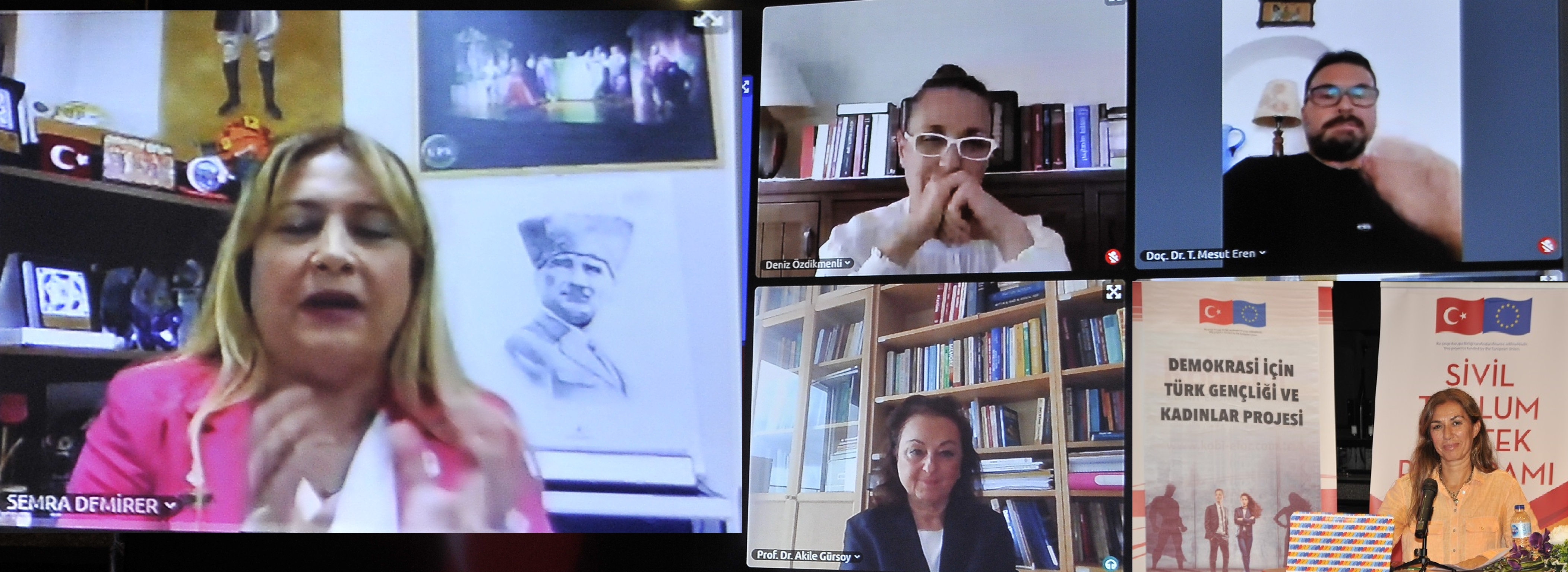
UPS Sports and Culture Club General Coordinator Semra Demirer said in her presentation: “We have three main options in this vital journey: To be a spectator, a passenger, and a driver. The spectators usually sit comfortably in their seats and just watch the opportunities and possibilities. The comfortable life offered to the passengers is a vehicle driven by others and they lead a happy life, sometimes peaceful, sometimes full of gossip on the route determined by it, but they put all the responsibility on someone else. What are the drivers doing? They choose the model of the vehicle and evaluate the possibilities or impossibilities offered to them. Good drivers, good leaders can take out opportunities from impossibilities.
Atatürk women will not stop. First of all, they are aware of why they set out and take responsibility. They are able to take themselves, their families, and eventually humanity from one note to another in confidence and joy. Their most important feature is their ability to set off spontaneously and take responsibility and courage while traveling to the future. Being sure of who they are and what they are… In this way, they sit behind the wheel, take risks, and take responsibility. While they are constantly in control of their lives, they also set an example to their environment.”
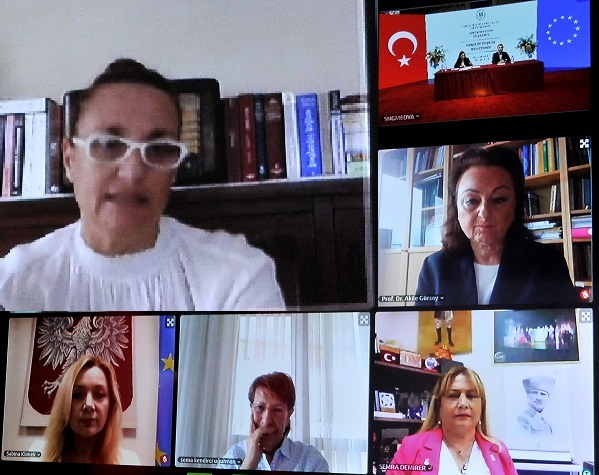
UPS Sports and Culture Club General Coordinator Semra Demirer said in her presentation: “We have three main options in this vital journey: To be a spectator, a passenger, and a driver. The spectators usually sit comfortably in their seats and just watch the opportunities and possibilities. The comfortable life offered to the passengers is a vehicle driven by others and they lead a happy life, sometimes peaceful, sometimes full of gossip on the route determined by it, but they put all the responsibility on someone else. What are the drivers doing? They choose the model of the vehicle and evaluate the possibilities or impossibilities offered to them. Good drivers, good leaders can take out opportunities from impossibilities.
Atatürk women will not stop. First of all, they are aware of why they set out and take responsibility. They are able to take themselves, their families, and eventually humanity from one note to another in confidence and joy. Their most important feature is their ability to set off spontaneously and take responsibility and courage while traveling to the future. Being sure of who they are and what they are… In this way, they sit behind the wheel, take risks, and take responsibility. While they are constantly in control of their lives, they also set an example to their environment.”


